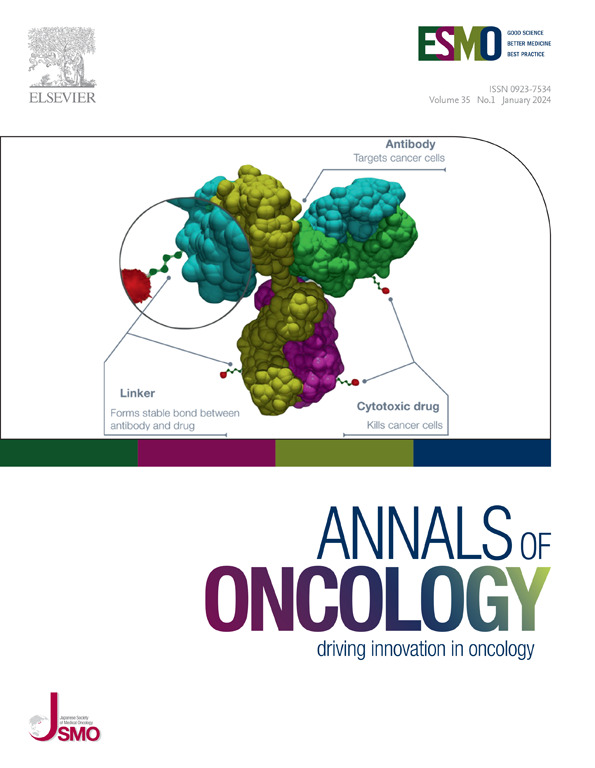ESMO Global Consortium Study on the availability, out-of-pocket costs, and accessibility of cancer medicines: 2023 update
IF 56.7
1区 医学
Q1 ONCOLOGY
引用次数: 0
Abstract
Background
The availability and affordability of safe, effective cancer therapies are core requirements for effective cancer control. Global disparities exist in access, however, yielding unequal cancer outcomes. The goal of this study was to provide updated data regarding the formulary availability, out-of-pocket costs, and accessibility of cancer medicines in countries across the full spectrum of economic development areas.
Methods
This study was conducted through an online survey based on a previously validated methodology. It evaluated the formulary availability, out of pocket costs, and actual accessibility of essential generic cancer medication commonly used for a wide range of cancers, including those on the 22nd WHO Model List of Essential Medicines (EML), and cancer medications used in eight high-incidence cancers. A total of 853 field reporters from 170 countries were invited to participate. The collected data were collated and peer-reviewed on the ESMO website, with final adjustments made accordingly.
Results
Data were collected by 317 reporters and 231 peer reviewers across 126 countries. The study revealed that patients in most high-income countries can access cancer medications without significant out-of-pocket expenditure, including novel treatments with high ESMO-Magnitude of Clinical Benefit Scale (ESMO-MCBS) scores. Conversely, in lower-middle and low-income countries, 40% of traditional chemotherapy agents deemed essential in the WHO EML are only available at full cost to patients.
Conclusions
This dataset provides a new and updated ‘Global Reference’ to enhance accountability for inequalities in access and availability of cancer medicines and to identify challenges and shortcomings to drive public health policies and positively impact national cancer control planning.
ESMO关于癌症药物的可得性、自付费用和可及性的全球联盟研究:2023年更新。
背景:安全、有效的癌症治疗方法的可获得性和可负担性是有效控制癌症的核心要求。然而,在获得治疗方面存在全球差异,导致癌症结局不平等。本研究的目的是提供有关处方可得性、自付费用和癌症药物可及性的最新数据,涵盖所有经济发展地区的国家。方法:本研究通过在线调查进行,基于先前验证的方法。它评估了通常用于多种癌症的基本非专利癌症药物的处方可得性、自付费用和实际可及性,包括世卫组织第22版基本药物标准清单上的癌症药物,以及8种高发病率癌症使用的癌症药物。共有来自170个国家的853名现场记者受邀参加。收集到的数据在ESMO网站上进行整理和同行评审,并进行相应的最终调整。结果:数据由来自126个国家的317位记者和231位同行审稿人收集。该研究表明,大多数高收入国家的患者无需大量自费即可获得癌症药物,包括具有高esmo -临床受益量表(ESMO-MCBS)评分的新疗法。相反,在中低收入国家,世卫组织基本药物清单中认为必不可少的传统化疗药物中有40%只能以全额费用向患者提供。结论:该数据集提供了一个新的和更新的“全球参考”,以加强对癌症药物获取和可用性不平等的问责,并确定挑战和不足,以推动公共卫生政策并积极影响国家癌症控制规划。
本文章由计算机程序翻译,如有差异,请以英文原文为准。
求助全文
约1分钟内获得全文
求助全文
来源期刊

Annals of Oncology
医学-肿瘤学
CiteScore
63.90
自引率
1.00%
发文量
3712
审稿时长
2-3 weeks
期刊介绍:
Annals of Oncology, the official journal of the European Society for Medical Oncology and the Japanese Society of Medical Oncology, offers rapid and efficient peer-reviewed publications on innovative cancer treatments and translational research in oncology and precision medicine.
The journal primarily focuses on areas such as systemic anticancer therapy, with a specific emphasis on molecular targeted agents and new immune therapies. We also welcome randomized trials, including negative results, as well as top-level guidelines. Additionally, we encourage submissions in emerging fields that are crucial to personalized medicine, such as molecular pathology, bioinformatics, modern statistics, and biotechnologies. Manuscripts related to radiotherapy, surgery, and pediatrics will be considered if they demonstrate a clear interaction with any of the aforementioned fields or if they present groundbreaking findings.
Our international editorial board comprises renowned experts who are leaders in their respective fields. Through Annals of Oncology, we strive to provide the most effective communication on the dynamic and ever-evolving global oncology landscape.
 求助内容:
求助内容: 应助结果提醒方式:
应助结果提醒方式:


